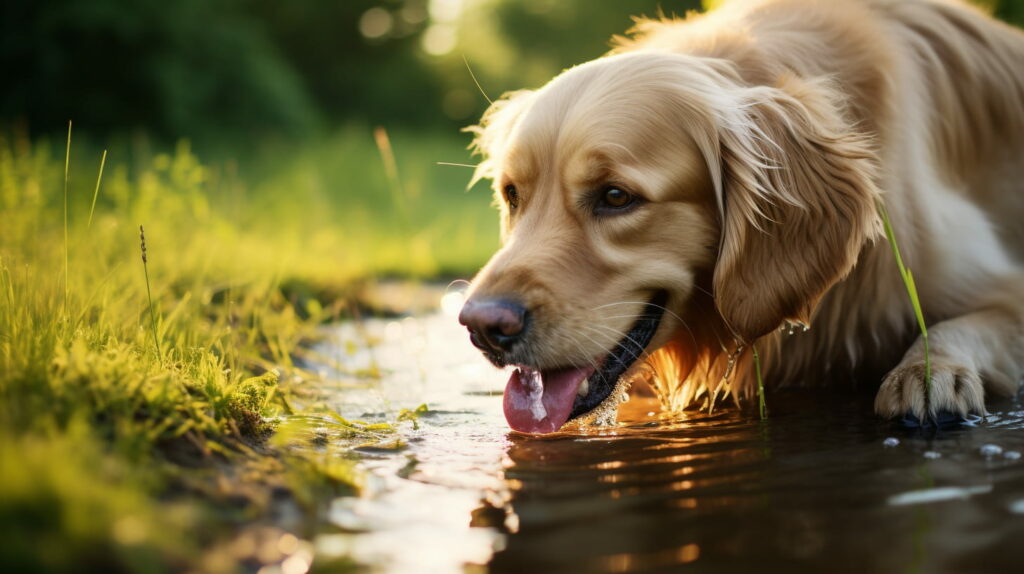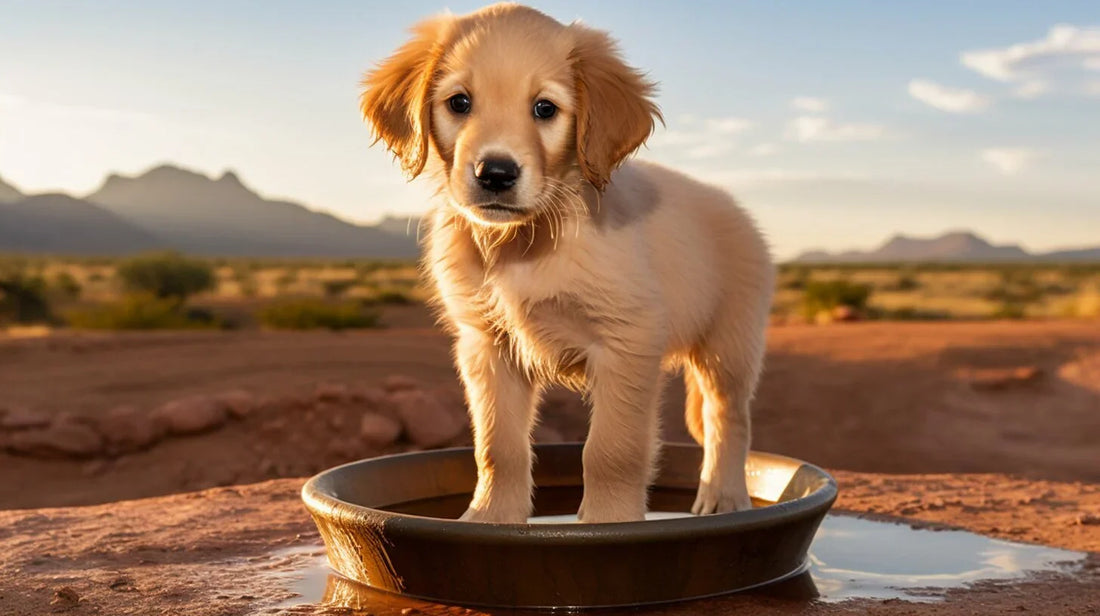If you're a dog owner, you may have noticed that your furry friend seems to drink more water than usual at times. While it's normal for dogs to drink water throughout the day, excessive thirst in dogs is a cause for concern and may be a sign of an underlying health issue.
In this article, we will explore the concept of canine hydration and discuss the potential causes of increased water intake in dogs. We will also provide tips on how to ensure your dog stays hydrated and when it's time to seek veterinary advice.

Key Takeaways
- Dogs may drink an excessive amount of water due to medical conditions, behavioral factors, or environmental influences.
- Providing fresh water, monitoring water intake, and incorporating moisture-rich foods can help ensure your dog stays hydrated.
- Consult with your veterinarian if you notice your dog drinking excessively as it may be a sign of an underlying health issue.
Understanding Canine Thirst and Hydration
Have you noticed that your furry friend seems to be drinking more water than usual? Understanding normal water consumption for dogs and recognizing excessive drinking or polydipsia in canines is crucial for pet owners.
In general, dogs will drink enough water to maintain proper hydration, usually around one ounce of water per pound of body weight. However, some dogs may exhibit increased water intake, which could be an indication of an underlying medical condition or due to behavioral or environmental factors.
What is Polydipsia?
Polydipsia is a condition where dogs drink excessive amounts of water, often leading to more frequent urination. In some cases, it can be a sign of a more serious underlying health condition. If you notice that your dog is drinking more water than usual or appears excessively thirsty, it is essential to consult with your veterinarian to rule out any medical issues.
Some of the common medical causes of excessive thirst in dogs include diabetes, kidney problems, Cushing's disease, hyperthyroidism, and others. Identifying and addressing the root cause of polydipsia is crucial for ensuring your dog's health and well-being.
Normal Water Consumption vs. Excessive Drinking in Canines
Understanding normal water consumption for dogs can help you identify when your furry friend is drinking excessively. Dogs need water to digest their food, regulate body temperature, and eliminate waste. As previously mentioned, dogs typically consume around one ounce of water per pound of body weight. However, some factors, such as hot weather, increased activity levels, diet changes, and stress, can influence a dog's water intake.
It is important to monitor your dog's water intake and be aware of any changes in their drinking habits. If you notice that your dog is drinking significantly more water than usual, it may indicate an underlying issue that needs to be addressed.
In the next sections, we will discuss potential medical and behavioral causes of excessive thirst in dogs, the dangers of dehydration, tips for ensuring your dog stays hydrated, and when to seek veterinary advice.
Potential Medical Causes of Excessive Thirst in Dogs
If your dog is drinking much more water than usual, it could be a sign of an underlying medical condition. Here are some potential reasons for excessive thirst in dogs:
| Medical Condition | Description |
|---|---|
| Diabetes | Diabetes mellitus is a common hormonal disorder in dogs that affects their ability to regulate blood sugar levels. Increased thirst and urination are common symptoms of diabetes. |
| Kidney problems | Dogs with kidney disease may consume more water than usual because their kidneys are not functioning properly. As a result, they may develop chronic dehydration and other complications. |
| Cushing's disease | Cushing's disease is an endocrine disorder that affects the adrenal glands. One of the most common symptoms of Cushing's disease in dogs is increased thirst and urination. |
| Liver disease | Liver disease can cause increased thirst in dogs by altering their fluid balance. Dogs with liver disease may also experience other symptoms such as loss of appetite, vomiting, and jaundice. |
If you notice your dog drinking excessively, it is essential to consult with your veterinarian to identify any underlying medical issues. With prompt attention and proper treatment, many medical conditions can be managed effectively.
Behavioral Factors and Environmental Influences
While medical conditions can contribute to excessive thirst in dogs, there are also behavioral and environmental factors that can influence their water intake.
In some cases, dogs may simply drink more water than usual due to hot weather or increased activity levels. Diet changes, such as switching to a kibble with a lower moisture content, can also cause dogs to drink more water.
Stress can also play a role in a dog's water intake, as some dogs may drink more water as a coping mechanism.
If you notice your dog drinking more water than usual, it's important to consider any recent changes in their routine or environment that may be contributing to the behavior.
Providing additional sources of water, such as using a pet fountain, can also encourage dogs to stay hydrated and reduce excess water consumption.
Dehydration and its Dangers
Dehydration is a serious issue for dogs, and it can lead to a variety of health problems if left untreated. As a pet owner, it's crucial to understand the signs of dehydration so that you can take action quickly if necessary.
One of the most obvious signs of dehydration is increased thirst, which can lead to your dog drinking more water than usual. Other signs of dehydration may include lethargy, dry mouth and nose, sunken eyes, and loss of appetite.
If your dog is showing signs of dehydration, it's important to address the issue right away. Dehydration can lead to serious complications, including kidney failure, heat stroke, and even death in severe cases.
To prevent dehydration, make sure that your dog always has access to fresh, clean water. You may also want to consider using a pet fountain, which can encourage your dog to drink more water. If you're concerned about your dog's water consumption, speak to your veterinarian for guidance on how to maintain proper hydration.
Tips for Ensuring Your Dog Stays Hydrated
Proper hydration is essential for your dog's health and well-being. Here are some practical tips to ensure your furry friend stays hydrated:
1. Provide fresh water at all times
Make sure your dog has access to clean, fresh water at all times. Change the water daily, and more frequently in hot weather or if it becomes contaminated.
2. Monitor water intake
Keep track of how much water your dog drinks each day, so you can quickly spot any changes or abnormalities in their water consumption.
3. Use pet fountains
Consider using a pet fountain to encourage your dog to drink more water. Pet fountains provide a continuous stream of fresh water and are especially useful for dogs who prefer running water.
4. Incorporate moisture-rich foods
Moisture-rich foods such as canned dog food, broth, and fresh fruits and vegetables can help keep your dog hydrated and supplement their water intake.
5. Take water breaks during exercise
If your dog is active, take regular water breaks to avoid dehydration. Bring water with you on walks and hikes, and encourage your dog to drink frequently.
6. Consider electrolyte supplements
In hot weather or after intense exercise, consider providing your dog with an electrolyte supplement to help replenish fluids and electrolytes lost through sweating.
By following these tips and prioritizing your dog's hydration needs, you can help keep them healthy and happy.
When to Seek Veterinary Advice
If you notice your dog drinking more water than usual, it is essential to monitor their behavior and water intake closely. While some increased thirst can be due to environmental or behavioral factors, it can also be a sign of an underlying medical condition. Here are some signs that indicate it's time to seek veterinary advice:
- Your dog is drinking significantly more water than usual.
- Your dog is urinating more often or in larger volumes.
- Your dog's urine is darker in color or has a strong odor.
- Your dog is lethargic or appears to be in pain.
- Your dog is exhibiting other unusual symptoms, such as vomiting or diarrhea.
If you observe any of these symptoms, it's best to consult with your veterinarian right away. Your vet can perform tests and exams to determine if there are any underlying health issues causing your dog's excessive thirst. Early detection and treatment can help prevent more serious health problems down the line.
Addressing Excessive Thirst in Dogs
If you notice your dog drinking more water than usual, it's important to address the issue promptly. Here are some potential treatment and management strategies your veterinarian may recommend:
| Treatment | Description |
|---|---|
| Lifestyle adjustments | Your veterinarian may suggest making changes to your dog's diet, exercise routine, or living environment to reduce excessive thirst. |
| Medication | In some cases, your veterinarian may prescribe medication to address underlying health conditions or help regulate your dog's water intake. |
| Close monitoring | Your veterinarian may advise you to closely monitor your dog's water intake and other symptoms to help identify potential triggers or underlying health issues. |
It's important to work closely with your veterinarian to develop an appropriate treatment plan for your dog's excessive thirst. Additionally, encouraging your dog to drink water on a regular basis can help promote healthy hydration habits.
By being proactive about your dog's hydration needs and addressing excessive thirst promptly, you can help ensure your furry friend stays happy and healthy.

Conclusion
In conclusion, understanding your dog's hydration needs is crucial for their overall health and well-being. Excessive thirst in dogs can be caused by a variety of factors, including medical conditions, behavioral factors, and environmental influences. It's essential to monitor your dog's water consumption and seek veterinary advice if you notice any significant changes in their drinking habits.
To ensure your dog stays hydrated, provide them with fresh water at all times, monitor their water intake, and incorporate moisture-rich foods into their diet. If you suspect your dog is dehydrated, watch out for signs such as lethargy, dry gums, and sunken eyes.
Remember that addressing excessive thirst in dogs requires a collaborative effort between pet owners and veterinarians. Your vet can provide you with guidance on potential treatments and management strategies for excessive thirst in pets. With proper care and attention, you can help your furry friend maintain optimal hydration levels and enjoy a healthy, happy life.
FAQ
Q: Why does my dog drink so much water?
A: Dogs may drink an excessive amount of water due to various reasons. Factors such as increased activity levels, hot weather, diet changes, stress, and certain medical conditions can contribute to excessive thirst in dogs.
Q: What is considered normal water consumption for dogs?
A: Normal water consumption for dogs can vary depending on factors such as their size, activity level, and the weather. As a general guideline, dogs should drink approximately 1 ounce of water per pound of body weight per day.
Q: What medical conditions can cause excessive thirst in dogs?
A: Medical conditions such as diabetes, kidney problems, Cushing's disease, and certain medications can lead to increased water intake in dogs.
Q: Can behavioral factors and environmental influences affect a dog's water consumption?
A: Yes, dogs' water consumption can be influenced by factors such as hot weather, increased activity levels, diet changes, and stress.
Q: What are the dangers of dehydration in dogs?
A: Dehydration can have serious health consequences for dogs. It can lead to organ damage, heatstroke, and other complications. Recognizing the signs of dehydration and maintaining proper hydration is crucial for your dog's well-being.
Q: How can I ensure my dog stays hydrated?
A: There are several tips you can follow to ensure your dog stays hydrated. These include providing fresh water at all times, monitoring their water intake, using pet fountains, incorporating moisture-rich foods into their diet, and considering factors such as weather and activity levels.
Q: When should I seek veterinary advice for my dog's excessive thirst?
A: If you notice your dog drinking excessively and it is accompanied by other concerning symptoms or changes in behavior, it is recommended to consult with a veterinarian. They can help determine if there are any underlying health issues that need to be addressed.
Q: What are the potential treatments for excessive thirst in dogs?
A: Treatment and management strategies for excessive thirst in dogs will depend on the underlying cause. Lifestyle adjustments, medication options, and working closely with your veterinarian can help address and manage this issue


